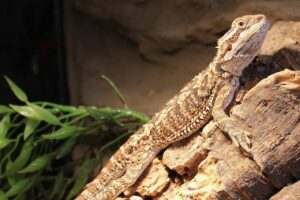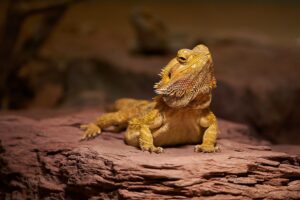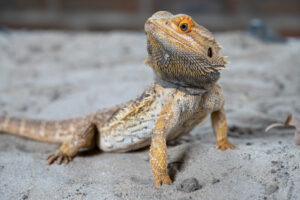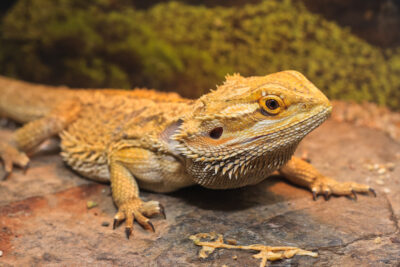Hey there reptile enthusiasts! Today, we’re delving into the curious world of bearded dragons and their dietary preferences. One burning question that often crosses the minds of dragon keepers is, “Can bearded dragons eat fuzzies?”
It’s a valid concern, considering the meticulous care these scaled companions require. So, buckle up and join me as we explore the intriguing realm of bearded dragon diets, shedding light on whether these charming creatures can indulge in the fuzzy feast or if it’s a culinary no-no. Let’s embark on this scaly adventure together and uncover the truth about our beardies and fuzzies!
Can bearded dragons eat fuzzies?

Bearded dragons are primarily insectivores, and their diet in captivity typically consists of a variety of insects, leafy greens, and some vegetables. While they may eat small vertebrates in the wild, it’s generally not recommended to feed them fuzzy rodents or other vertebrates regularly in captivity.
Fuzzies are often young mice or rats covered in a fine layer of fur. The nutritional requirements of bearded dragons are better met with a diet consisting mainly of appropriately sized insects, such as crickets, mealworms, dubia roaches, and various other insect species. Feeding a well-balanced diet is crucial for their health.
If you are considering adding variety to your bearded dragon’s diet, consult with a reptile veterinarian. They can provide guidance on suitable options and ensure that your pet’s nutritional needs are met without compromising their health. Always monitor your bearded dragon for any signs of distress or digestive issues when introducing new foods.
What Are Fuzzies?
Nutritional content of fuzzies

“Fuzzies” is a colloquial term often used to describe warm, positive feelings rather than a specific food or substance with nutritional content. In the context of emotions or sensations, it doesn’t have a direct nutritional value like food.
However, if we think metaphorically and consider sources of fuzzies like cute animals or pets (often referred to as “fuzzies”), you might be interested in the nutritional information related to pet food or animal care. The nutritional content of pet food varies significantly based on the type of animal, brand, and specific product.
For instance, pet food labels typically provide information about:
- Protein: Often sourced from meat, fish, or plant-based sources.
- Carbohydrates: Derived from grains, vegetables, or other sources.
- Fats: Including essential fatty acids.
- Vitamins and Minerals: Added to ensure a balanced diet.
- Caloric Content: Providing energy for pets.
But if you’re referring to a different context or have a specific type of “fuzzies” in mind, please share more details so I can offer more precise information.
Can Bearded Dragons Eat Fuzzies?
In the context of bearded dragons, the term “fuzzies” can refer to small, fuzzy rodents such as baby mice. Bearded dragons are omnivorous reptiles that have a varied diet consisting of insects, vegetables, and occasionally small vertebrates. However, it’s crucial to ensure that the food provided is appropriate for their size and nutritional needs.
Feeding bearded dragons fuzzy rodents like baby mice can be done, but it’s essential to consider the following points:
- Size and Age: The size and age of the bearded dragon matter. Fuzzy rodents are more suitable for larger, adult bearded dragons. Younger dragons may struggle to consume larger prey, and it might not be nutritionally balanced for them.
- Variety in Diet: While bearded dragons can consume small vertebrates, their diet should be diverse. Insects, leafy greens, and vegetables are important components of their diet. Fuzzy rodents should not be the primary or sole source of nutrition.
- Nutritional Balance: Fuzzy rodents can provide essential nutrients like protein, but it’s important to ensure a balanced diet. Calcium and vitamin supplements may be necessary, and the overall diet should meet the dragon’s nutritional requirements.
- Prey Size: The size of the fuzzy should be appropriate for the size of the bearded dragon. It’s important not to offer prey that is too large, as this can lead to digestive issues or impaction.
Before introducing fuzzy rodents or any new food items into a bearded dragon’s diet, it’s advisable to consult with a reptile veterinarian. They can provide guidance based on the specific needs of your individual dragon and ensure that its diet is well-balanced and suitable for its age and health status.
Potential benefits and risks of Bearded Dragons Eating Fuzzies
Feeding bearded dragons fuzzy rodents (baby mice) can have both potential benefits and risks, and it’s important to consider these factors carefully:
Potential Benefits:
- Source of Protein: Fuzzy rodents are a good source of protein, which is important for the growth, development, and overall health of bearded dragons.
- Variety in Diet: Offering a variety of food items, including small vertebrates like fuzzy rodents, can help ensure a more diverse and balanced diet for bearded dragons.
- Natural Behavior: Hunting and consuming small prey items can mimic the natural behavior of bearded dragons in the wild, providing mental stimulation and exercise.
- Calcium and Phosphorus: Depending on the type of feeder rodents used, they may provide a source of calcium. However, the calcium-to-phosphorus ratio should be balanced, and supplementation may still be necessary.
Potential Risks:
- Choking Hazard: Inappropriate prey size can pose a choking hazard, especially for younger or smaller bearded dragons. Ensure that the size of the fuzzy is suitable for the dragon’s size.
- Digestive Issues: Large or hard-to-digest prey items can lead to digestive issues, including impaction. It’s crucial to provide appropriately sized prey and monitor the dragon’s digestion.
- Nutritional Imbalance: Relying too heavily on fuzzy rodents may lead to an imbalanced diet, as bearded dragons also require a variety of insects, leafy greens, and vegetables to meet their nutritional needs.
- Parasites and Diseases: Feeder rodents can carry parasites or diseases. It’s important to obtain feeder rodents from reputable sources and, if possible, quarantine them before feeding.
- Overfeeding: Offering fuzzy rodents too frequently can lead to overfeeding, causing obesity and related health issues. Moderation is key, and the overall diet should be well-balanced.
Before introducing fuzzy rodents or any new food items, it’s highly recommended to consult with a reptile veterinarian. They can provide personalized advice based on the specific needs and health status of your bearded dragon. Regular veterinary check-ups are also essential to monitor the dragon’s overall health and adjust its diet as needed.
How to Introduce Fuzzies to Bearded Dragons

Introducing fuzzy rodents to bearded dragons requires careful consideration to ensure the safety and health of the reptile. Here are steps you can follow to introduce fuzzies to bearded dragons:
- Assess the Dragon’s Size and Age:
- Fuzzy rodents are more suitable for larger, adult bearded dragons. Younger dragons may struggle with larger prey, and it might not be nutritionally balanced for them.
- Choose Appropriate Prey Size:
- Select fuzzy rodents that are appropriately sized for your bearded dragon. The prey should be smaller than the space between the dragon’s eyes to avoid choking hazards.
- Source Quality Prey:
- Purchase feeder rodents from reputable sources to minimize the risk of parasites or diseases. It’s crucial to ensure the prey is healthy and appropriate for reptile consumption.
- Quarantine Prey if Possible:
- Consider quarantining feeder rodents before offering them to your bearded dragon. This helps prevent the introduction of potential health issues.
- Feed in Moderation:
- Fuzzy rodents should be part of a varied diet and not the sole or primary source of nutrition. Feed them in moderation to avoid overfeeding and nutritional imbalances.
- Monitor the Dragon’s Behavior:
- Observe your bearded dragon’s behavior during and after feeding. If they show signs of distress, struggle, or have difficulty swallowing, the prey size may need adjustment.
- Supplement as Needed:
- Depending on the nutritional content of the feeder rodents, you may need to supplement the dragon’s diet with calcium or other vitamins. Consult with a veterinarian to determine the appropriate supplementation.
- Provide Fresh Water:
- Always have fresh water available for your bearded dragon. Even though they get most of their hydration from their diet, water is still essential.
- Consult with a Veterinarian:
- Before introducing fuzzy rodents or any new food items, consult with a reptile veterinarian. They can provide advice tailored to your specific dragon, ensuring a healthy and balanced diet.
- Regular Veterinary Check-ups:
- Schedule regular veterinary check-ups to monitor your bearded dragon’s overall health and discuss any dietary adjustments or concerns.
Remember that every bearded dragon is unique, and individual needs may vary. It’s crucial to tailor the diet to your specific dragon’s age, size, and health status. Regular observation and consultation with a veterinarian will help ensure the well-being of your bearded dragon.

